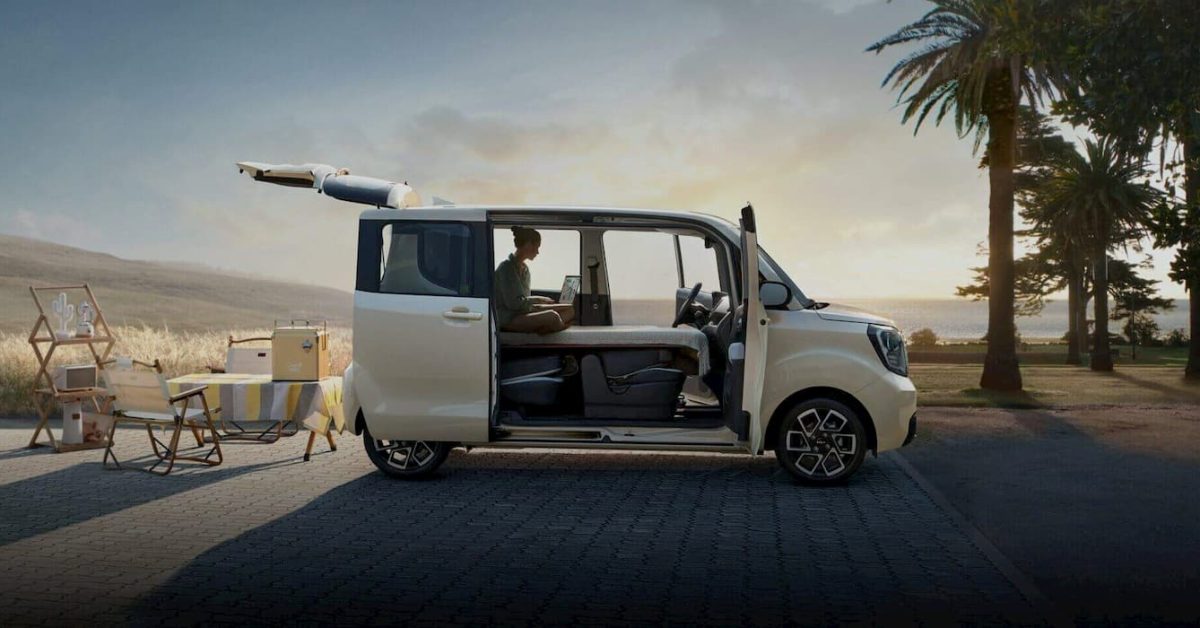Kia officially launched the 2025 Ray EV in Korea with the same low starting price of under $21,000. However, the new model year gains additional features. With incentives, the entry-level electric car can be bought for as little as $15,000 (20 million won).
The “New Kia Ray” was reborn as an entry-level EV last year. After opening pre-orders last August, starting at around $20,500 (27.35 million won), the Kia Ray EV secured over 6,000 reservations in less than a month.
120ish miles range is more than enough for majority of us drivers despite what people think. Yes long trip will require recharge (which will be quick with tiny battery) or a second car.
This is the near term EV future we should strive for vs expensive, heavy, and environmentally painful 300+ mi SUV and truck.
Alternative is PHEV+range extender like that byd truck
As someone who drove an original fiat 500e with a similar range, I can assure you this is not enough battery for anywhere but the market it’s designed for (South Korea). You will eat through that “best estimate” of 120 miles in a day’s worth of driving, especially with additional passengers and the AC running.
The average US daily drive is less than 40 miles. Accounting for outliers and a margin, let’s conservatively say 60 miles. That’s still probably more than most average commutes.
That’s half the best case rated mileage, which is for sure more than the “realistic” mileage with a full vehicle and A/C running. There’s no way that would reduce it by half, even from the best case rating.
deleted by creator
You’re going to get 100 miles of real world range out of that 120 rating. Then you will lose 20 for running the AC. That’s 80 miles. If you add passengers, that’s another 20 you will lose. You’re now down to 60 miles of range. Better hope your commute is under 30 miles each way and that you don’t have to stop for groceries or something on the way home. Also that last 20 miles of battery power, the car is going to go into power saving mode and will turn off the AC.
I have a 2016 EV with 130km of range. Your estimates are pessimistic unless you add in snow and change AC to heat and your passenger is huuuuge.
BTW its range is fine for town and nearby so it’s a great daily driver.
Most people really do drive less than 80km/day. We need two vehicles so the 21-year old ICE vehicle is used for road trips. Otherwise we would simply rent for the rare long haul.
I have an EV with 250 miles range. Typically gets more than that, not less, in the summer with AC on.
Lucky you. Neither of the EVs I’ve owned have worked this way. The guess o meter automatically goes down when the AC is turned on.
https://cars.usnews.com/cars-trucks/advice/what-ac-does-to-your-ev-range
“A study by AAA found that a temperature of 95 degrees outside translates to a 17% range loss.”
Losing range has way more to do with speed than AC or an extra passenger. Taking side roads going 40 mph will give me a massive range boost vs the highway going 70-75 mph (2011 Leaf with “82 miles” range on the fully charged GOM).
I barely notice a difference with extra passengers and weight (which makes sense since an extra passenger adds about 0.5% to the cars weight.
And running heat kills battery much more than AC. AC will impact it a bit, but usually only about 5% in my estimation
Can confirm, I had a '11 Leaf SV in the boiling desert heat. I could get 85 miles out of it when the gom started at 70 (I think the highest I saw was 5.4mi/kW) but if you - hypothetically cough cough - ran it flat out at the 93mph top speed, it could eat through that 70ish gom in about 15 miles. Speeds above ~50 absolutely tank the Leaf’s range.
Heat is bad unless your model has a heat pump. Late 1st gens had it (as an option, I think). I’ve heard it’s more than worth the upgrade. But heat on the battery is way worse, as it kills cells fast. I lost 10% SoH (I think that’s the correct term, been a while) in 4 months in the desert heat. Environment is the biggest factor by a massive margin for the Leaf. Range is short term pain but battery degradation is permanent and can only be solved with replacement. It’s the one thing I didn’t like about the Leaf - everything else is great.
1500 kg car and one 75 kg passenger makes 5%, with 3 passengers 15%.
I stand corrected. I still don’t think it affects range much
Do they officially call it a guessometer?
I don’t think so. That’s just we all call it
It’s fine for some. I’ve been driving my Leaf with 90 miles range for eight years and haven’t needed more. It’s a daily commuter car.
But I’m lucky enough to have two cars in the family.
How many miles a day did it actually get?
deleted by creator
It was found recently that most trips were less than three miles, with only 2% of all trips made are more than 50 miles.
That number is a little misleading as it counts every stop as a “new trip.” I could leave my house and drive 60 miles, stopping every 10 minutes, and they’d count that as 20 trips of 3 miles or less. Meanwhile a car with a 120 mile range probably wouldn’t have enough juice to make it back home depending on how far away my last stop is from the house.
Multiple stays of longer than 10 minutes before returning home were counted as multiple trips
I see your point, though my own experience is similar to @[email protected], and perhaps just as anecdotal as yours, is that people more often take trips that are A-B-A, A-C-A, A-D-A, than they do A-B-C-D-A.
I suppose it’s just a matter of convenience or time constraints, but running more errands in one trip is an overall time save in many occurrences, and more people should do that.
Makes me wonder how many of these ‘trips’ are one stop then back home and is many contain multiple stops. Or if it would drastically change the average to remove the multiple stop trips.
Thanks for raising that point, I hadn’t considered it before.
Even A-B-A is counted as “two trips” which immediately doubles the number of trips and halves the distance of each. I have no idea what the rates of A-B-A versus A-B-C-D-A trips are, but their methodology here makes the entire study seem almost pointless, at least when trying to gauge the average mileage people are driving per day in reference to EV range.
Even using average yearly mileage can be misleading as almost nobody drives a fixed number of miles 7 days a week. I have a fairly long commute at 100 miles round trip, but my average daily mileage over a year is only 60 miles, or 60% of what I actually drive when I’m going to work. Someone telling me that a 120-mile range vehicle would work just fine for me based on my daily average would be completely wrong in that assessment when you account for efficiency losses and extra load from things like highway speeds, using the heater, or me having to make side trips somewhere on a work day.
That’s another good point. I guess I assumed that A-B-A was a trip to the grocers and back, for example, but a trip out to the countryside to see the inlaws for the weekend would count as two trips, the A-B and the B-A. Counting the grocery trip as two trips doesn’t seem right to me, I don’t take hours in there.
For what it’s worth, the various electrification plans I’ve been involved with all assume that these ‘long stops’ being the employment location, the hotel, the theatre, the doctors offices, all have charging on site. If this were the case - even just at the workplace - it would be a big help for electric vehicles that have small capacity batteries.
That’s because people leave their house an insane number of times to go buy one thing at the store and come back. I swear my neighbors leave the house and come home again 10-15 times per day.
Obviously people often don’t drive very far for work or shopping, but many do maybe every weekend or once or twice per month take a longer trip to visit family or for leisure.
The car needs to be able to handle that, without being a huge pain to have to charge all the time.The idea that 90% of trips are short is a moronic argument for selling EV with small batteries, unless people have multiple cars, which most people don’t unless they need to, and even then short range can be a problem, because dependency on the cars, means that both cars need to be able to fulfill the required tasks.
Edit:
Funny how this is downvoted, when mostly everybody agree the FIAT 500 sell badly because it has too little range for the price.
Even if only a few percent are short trips, it’s a pain to have to charge multiple times on a single trip occasionally, like once per week.Visiting family out of town every weekend is 104 trips a year. Commuting each work day is 520 trips. That’s 16% of all those trips that are long distance.
Once you add in the grocery getting; the drives to school (only 10% of children walk or ride bikes); the doctors appointments; the local leisure related trips; I can see how 90% of trips could be short range - and that’s still accounting for taking a long weekly trip, which I don’t think most people do.
From the way you wrote, “The car needs to be able to handle that, without being a huge pain to charge all the time,” gives me the impression you don’t like electric vehicles and might not be open to any of these conversations without it turning into an argument. I could be misinterpreting your tone, and if so I apologise, but I don’t think the content nor the conclusion of that study should be called moronic.
I’m not disputing the 10% maybe even 2% short trips is true, I’m arguing it’s a bullshit argument for making cars with short range.
gives me the impression you don’t like electric vehicles
Which is false, I’m all for electric, and my next car will definitely be an electric. But not one that can’t handle what I do in weekends, which would be ridiculous.
For me that means 450 km range minimum. Which I may only need once per month, but the alternative would be to rent a car once per month, which is obviously idiotic, because it’s extra hassle and more expensive than buying the proper car to begin with.
Alternatively having to charge on the way, but the 450 km is for charging once, so less than that would mean charging twice or more, and I don’t want that extra time added on a trip that is already long.Cars with smaller batteries, very often also charge slower.
I suppose that makes me an idiot?
We go out of town every few months for a weekend, and when we go somewhere that doesn’t have train service, I rent a car to make the trip. It’s around $100 (not including fuel) for the two days depending on which model they have at the time. Even if we did this every month, it’s a bit silly to suggest that it’s cheaper to have bought a vehicle with double the range for these infrequent occurrences of long distance travel. Especially so considering the largest cost of manufacturing an electric vehicle by a hefty margin is the battery pack.
From this list of the 19 vehicles with over 450km range, 10 of them are trucks or SUVs so we can ignore them from this discussion. Of the 9 remaining, only 4 of them cost $60k CAD or below:
- $60k - Tesla Model Y
- $60k - KIA EV6
- $55k - Hyundai Ioniq 6
- $55k - Tesla Model 3
This year’s Nissan Leaf can go 240km, at $28k. At your minimum, you’re looking to spend double the money to get a car that can go double the range. For the extra $28k spent on an Ioniq 6 or Model 3 over the Leaf, you could rent a car for the weekend getaway every single month for the next two decades.
Some years ago, I wanted to know if an electric car would fit my lifestyle. I drove a gasoline sedan at the time. I decided to refuel my car at the end of every day, and take notes on the distance I had driven and where the needle was on the gas gauge. I did this for two months in the summer, when I knew I did most of my driving. The data I collected about my own habits showed me I didn’t really drive a lot most days. There were only a handful of times I went over 100km in a day. The gas needle rarely dipped below three quarters full, and never below half.
There’s about 12,000 gas stations in Canada, and nearly 9,000 charging stations - up 30% last year. If you’re able to plug in for fifteen minutes or so at a destination you’re already stopping at, that really helps with the longer distance issue. It’s only getting easier to have a low range car as the years go by.
Regarding charging times
I wouldn’t say batteries charge slower because of their smaller capacity. The lower charging speed is probably a cost saving measure which makes it incompatible with the fastest charging stations around. The Nissan Leaf will gain 190km of range in 40 minutes, or 5km per minute. Tesla’s can get 280km in 15 minutes, or 18km per minute. That’s about a 4x difference, but it costs so much more to get there.
The Leaf has a capacity that per kilowatt provides 6km of range. The Model 3 gets 7km per kilowatt. Is one extra kilometre per kilowatt worth buying the equivalent of two Nissan Leafs? Not to me it isn’t.
In my view, driving out of town every other week is a poor argument for buying a vehicle with twice the range than it needs the other 339 days of the year.
I suppose that makes me an idiot?
Absolutely not. All the cars you list have decent to excellent range.
The argument was primarily used early on in marketing to try to sell cars that were basically only fit as city cars. Cars with LESS than 100km range.
Obviously they didn’t sell well, and this was tried for years until Tesla came out with the model S.
Then the competition scrambled, and made semi real cars, but still with less than 200km range. For instance Nissan Leaf and Renault Fluence, Even BMW came out with an i3 model as recently as 2020 that had below 200km range, despite being quite expensive!Today most even cheap EV cars have better than 200km range, and that may be more relevant, but the batteries have gotten cheaper, so I’m not sure it makes sense to make cars with below 300 km range anymore.
With Your Ioniq 6 the small version has 55 Kwh battery, which AFAIK is the lowest on your list with about 400km range. The models with the bigger77 kWh have about 600 km range. More than enough and would be absolutely fantastic for me.
The 400km is just short of what I want, which can usually be done with about 60 kWh battery.AFAIK all the cars you list also have decent fast charging, something small battery cars like Stelantis have been behind on too. So if the battery isn’t big enough for your trip, you are likely to spend way more time charging, than just the difference in battery size.
Despite there is truth in what you write, we see the FIAT 500 which is probably about the cheapest EV in Denmark currently, it doesn’t sell probably because of its sub 300km range. The same is true for every other Stelantis EV that should be pretty popular if you look at how the brands have usually sold here.
I wouldn’t call a single car you list short range, and even the shortest range on your list as far as I can tell, exceeds your daily needs by a factor 4.
Basically all your listed cars would be good enough. I could probably live with 400km instead of 450km if it was a good deal.
Obviously other people have other use cases, and maybe 300km is good enough for most, once they get used to it. It could even be less, if/when charging becomes as fast and easy as filling gas (gasoline).So which of the Ioniq 6 was it? 53 or 77 kWh?
Edit PS:
Another reason for longer range than needed for daily use, is that on Motorway (highway with 130 km/h speedlimit) the range is shorter by as much as 30%, and in Winther it’s also shorter by about as much. So in Winter on Motorway you risk having only half the rated range. That would require 3 charges for my longest monthly trip of about 500km. And compared to our ICE car, it would take more than an hour extra to make the drive, because your have to drive slower to not use too much battery, and you need to stop about 3 times 15 minutes for charging.
This is the near term EV future we should strive for vs expensive, heavy, and environmentally painful 300+ mi SUV and truck.
Even for the 300+mi vehicles we should be striving for sedans and wagons, not SUVs and trucks. Less weight and height means a better combination of handling and ride quality. There’s a good reason Mercedes charges you more for the S-Class sedan than the bigger, heavier GLS-Class SUV. The former is optimized for luxury, the latter they market as the “S-Class of SUVs”, but really, it’s optimized for size. This is despite the fact that usually there’s a “SUV tax”. SUVs just cost more than their equivalent sedans and wagons.
deleted by creator
(which will be quick with tiny battery) <
This is where you’re wrong.
Charging is not linear. EV’s battery only fast charging to about 80%, after that it would halt to a crawl. It would take way less time to charge a 60kWh battery from 20% to 70% (50% = 30kWh) than it would take to charge a 30kWh battery from 0% to 100%.
That’s not enough to make it to the next major city over in some parts of the US ; sure for a daily driver commute vehicle with a charger at each end that’s great, but if you have to leave for any reason (such as say, a natural disaster like a hurricane that just hit), you’re fucked. Having to own multiple vehicles isn’t a solution, or an option for many.
@lurker8008 @MyOpinion Mazda offers a series hybrid PHEV+range extender just not ever in Canada. I had a hard time sourcing new winter tires for my Fit because there is no Canadian market for small tires anymore.
Old used truck and a BEV is just great.
Please bring to North America
“We hear you! Here is another hideous SUV with absolutely awful, wildly inefficient energy-to-range figures. Enjoy!”
It’s made exclusively for the SK market.
It also likely wouldn’t pass US safety ratings because it’s lightweight and tiny.If it does it’ll get the import tax so look forward to it being in the high 20ks.
unless they build in the US?
I don’t know that they’re allowed to. I saw China is building some of them in Mexico because of it.
The headline should specify Korea. I mean, I know it was too good to be true I guess.
Neat, how long till we find out they did something insane like all use the same key or are all running a web server that allows access to the gas and brakes directly without authentication?
Edit: to be clear, no issue with the goal of more electric vehicles. But Kia is having some real deep seated quality issues the last… 13 years according to my insurance agent. They won’t even touch a Kia without factory installed push button ignition since 2011. Then there’s the whole “we’re leaking all your data and access to your car thing”
I’m still too broke for that. Can I just steal one with a stick with the end shaved to be approximately the same dimensions as a usb A connector?
No, no no. They fixed opting not to put a cheap anti theft device in a decade of cars by “updating software” and installing “dont steal this” window stickers. Some lucky devils that couldn’t get software got a new metal ring in their steering column, and then a sticker. You could even go to your local police department in some locations and get a free, ridiculously useless steering wheel lock, if you heard about it. Mail them to customers? Nah, that might cost money.
Dont worry, they only did this in the US. Every other nation has laws about having an immobilizer in cars, but not the good ol’ USA. Kia even had them in the same models sold elsewhere, just not the US models.
It only affected about 1 million people so far though, who have at best had to go in and have a half ass fix applied at a dealership while being upsold. That just leaves 7 million unprotected cars out there.
At worst, whats a few thousand stolen cars and even more shattered windows among friends? Surely no fine or penalty should occur.
Ohh, also, the software update doesn’t seem to be working.
You’re a bit late to party
That top picture made me think it was a camper bus (like EV.Buzz) but at a fraction of the price.
But, alas…
Oh Christ why is it so ugly
I thought the box-shaped car fad died out 10 years ago
Not in Asia. Still very trendy in a lot of countries here. Might be ugly outside, but it sure optimizes size and comfort inside.
For that reason I’m annoyed at large SUVs losing their boxiness in recent years. Like, I get it for sedans and stuff, but if I’m driving a big SUV my main concern is utility (you know, the U in SUV) and a curved back side makes it that much harder to fit my grandma’s kitchen table in the back when I give it to my cousin.
It’s literally a miniature Kia Soul which is hilarious. I don’t think it looks that bad and the boxy design is quite functional.
Utility never goes out of style
Functionality. Based on the built in bed in the picture I’d say they have a head start on the market.
Kia saves money by not having any designers in the company, they just steal other car shapes from years ago
Nice design, but only goes about 100 miles to the charge. That’s unacceptable in today’s market. It will go even fewer miles with additional passengers and the air conditioning turned on. I’d imagine they put a small battery in it to hit that lower price point.
It’s for the Korean market. It’ll get you from Seoul to the east coast on a single charge and there’s high-speed rail just about everywhere for your longer journeys. Perfectly fine for most people in such a small, densely-populated country.
That’s fine but people elsewhere shouldn’t get too excited about it. When the price is listed in US dollars as some sort of bargain instead of the currency where it’s sold, it gets misleading.
Probably because it’s reported by english-speakers
why are stupid looking cars so fashionable now?
What’s so dumb about a electric ‘panel van’ looking thing?
Got passed by a Toyota xD van today and was thinking about how well these would sell in the US with a decent battery in them. The rectangular design means you could double stack the battery capacity underneath the floorboard space.
It’s not like it’s a motherfucking Honda Odyssey.
















